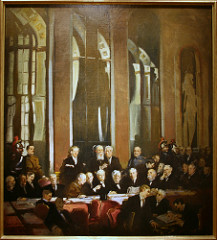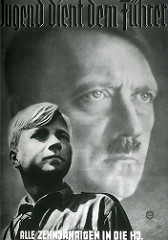Paper 1: The Rise of Nazi Germany and A Failure of peacekeeping
Unlock all answers in this set
Unlock answersquestion
Treaty of Versailles

answer
The treaty, signed in January 1919, was excessively harsh and created discontent amongst the German population. For example, the Treaty stripped Germany of land, coal mines, and fishing assets in addition to mandating that Germany pay reparations of $32 billion. These harsh reparation payments we estimated by John Maynard Keynes to be 3 times the amount Germany could pay and make the collapse of the Weimar Republic inevitable.
question
Lack of Support for the Weimar Republic /democracy
answer
According to Hannah Arendt in The Origins of Totalitarianism, the Weimar Republic was assured to fail because most German's rejected democracy and adhered to traditional authoritarianism. This explains the fact that 20 different political coalitions took power in the Weimar Republic from 1919 to 1933. Also, the German Army wanted a more authoritarian leader and offered little support to the Republic. In 1920, army officers attempted a Putsch in Berlin.
question
Failed Economic Policies of the Weimar Republic
answer
In November 1923, one American dollar was worth 4.2 trillion marks due to inflation. Despite this inflation, government tax revenue covered only 1% of total government spending. Also, according to Richard J. Evans in The Coming of the Third Reich, the deflation focused economic programs enacted by the Republic to counter the Great Depression led to layoffs, outraging the general public.
question
The Great Depression
answer
In October 1929, the New York Stock Exchange Collapsed, casting European economies including Germany's into depression. In Germany, unemployment went from 1,400,000 in August 1929 to 3,000,000 in December. The depression immediately widened the Nazi voting base, evidenced by the fact that Nazi votes went up from 2.6% in 1928 to 18.3% in 1931. According to Michael Burleigh in The Third Reich: A New History, the Depression led to an increase in Nazi votes because of Nazi success in capitalizing on the social disorder created by the Great Depression.
question
Nazi Propaganda

answer
The earliest form of Nazi propaganda, Mein Kampf by Adolf Hitler, advocated for Lebensraum or literally \"living space\" for the German people. Nazi propaganda focused on exploiting the worsening economic and social conditions of Weimar Germany. Hitler advanced his ideals through the Völkischer Beobachter, a Nazi Party propaganda poster that circulated from 1925 to 1929. Joseph Goebbels was appointed head of the Nazi party propaganda by Hitler in April 1930.
question
The Social Democrats versus the Communist Party
answer
Although the Social Democrats and Communist Party were on the left ideologically and were strong in votes, they were against each other and feuded often in the Reichstag. Ernst Thalmann, a prominent Communist party leader, evidences this division by his statement that \"There is no difference between a fascist dictatorship and a bourgeois dictatorship.\" Both parties had trouble securing ample funding to compete with the Nazi's because their voting base was much poorer.
question
Hitler's skilled political maneuvering
answer
Hitler gained power in the German government through his charismatic and dramatic speeches and ability to exploit leadership concerns about labor and bolshevist movements. At first, Hitler seemed to be a more moderate candidate for the position of Chancellor, however once he gained enough support, Hitler eliminated his competition by breaking up communist meetings, limiting freedom of speech and censoring newspapers.
question
The Reichstag Fire

answer
In 1933, the Nazi's exploited a fire in the Reichstag by blaming the incident on a member of the communist party. The Nazi's took the opportunity to push Hitler into power by arresting opposition leaders and threatening to arrest anyone who \"disturbed the peace.\"
question
The Munich Beer Hall Putsch
answer
In November of 1923, a Nazi attempt to overthrow the Weimar Republic failed miserably. Although the putsch was unsuccessful, Hitler's trial was broadcasted and the Nazi Party received much-need public recognition. According to Arthur Rosenberg in A History of the German Republic, the role of the Beer Hall Putsch is overemphasized, evidenced by the fact that from 1924 to 1928, total votes for Nazis fell from 6.5% to 2.6%.
question
Differences in Voting Bases
answer
The Nazi's primarily appealed to the right-wing members of German society who tended to be the upper-class. The Social Democrats primarily appealed to the poorer left-wing members of society. The social differences in the voting bases of the Nazi Party versus its opponents gave the Nazi's a vital edge in party contributions and funding.



